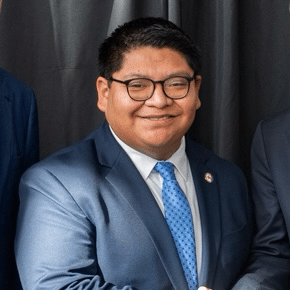
Lorenzo Pedro, UNC MPA current student
This January the UNC MPA program welcomed 21 new students into the program.
Read about a few of them below.
Hometown: Morganton, NC (currently resides in Durham, NC)
Alma mater: UNC Greensboro

Lorenzo Pedro, UNC MPA current student
Degree: BA Psychology, minors in Photography and Spanish
Current Job Title:
Legislative Liaison for the North Carolina Department of Transportation
What are your areas of interest in the program?
My primary areas of interest involve enhancing my leadership skills to succeed in diverse professional environments while leveraging my background in curating and drafting legislation to deepen my understanding of policy implementation within an MPA program. This knowledge can be applied effectively in both the private sector and across different levels of government.
Why did you decide to get your MPA at UNC?
I chose UNC’s MPA Program because it is nationally recognized and offers students the opportunity to interact with professors and instructors who have extensive knowledge and real-world experience in public administration. The program’s flexibility caters to professionals like myself, allowing us to utilize our skilled backgrounds to engage in meaningful discussions and connect with fellow students. Moreover, UNC promotes an environment that encourages understanding of diverse perspectives, ultimately broadening our awareness of what is important in public administration.
Hometown: Charlotte, NC (currently resides in Washington, D.C.)
Alma mater: Tulane University
Degree: BA Sociology, Jewish Studies, minor in Political Science
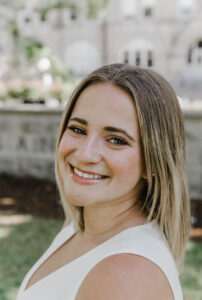
Current Job Title:
Associate Regional Director for BBYO
What are your areas of interest in the program?
When researching graduate programs in my area of interest, I immediately noticed that MPA at UNC truly has it all. The program’s focus on developing public service leaders despite their current occupation or interests stood out to me. As an aspiring nonprofit executive, I was originally hesitant to be entering a government-focused space, but upon looking through the curriculum and meeting my peers, I knew MPA@UNC was the right fit. I am confident I will gain skills in nonprofit management, organizational theory, financial management and general public service while learning from peers and instructors who serve in an array of public service jobs.
Why did you decide to get your MPA at UNC?
What stood out to me most about MPA@UNC was their focus on people. During my interview, Cara Robinson, director of admissions, mentioned that they are one of the few virtual graduate MPA programs that goes through an interview process. She explained that the reason for this is because, despite being completely virtual, they want to build a strong cohort of driven leaders. Graduate school, like undergrad, should not only be about learning texts and completing exams, it should also focus on the ability to engage and learn from classmates with varying backgrounds on a personal level. MPA@UNC is unique as it found a way to accomplish this completely virtually, allowing students to continue their full-time careers while getting the most out of a graduate program. I look forward to the ways in which MPA@UNC will allow me to grow as a public service leader.

Hometown: Currently resides in Fort Huachuca, Arizona
Alma mater: Florida State University
Degree: BA International Affairs
Current Job Title:
Military Intelligence Officer, United States Military
What are your areas of interest in the program?
My greatest areas of interest at this time are the degree concentrations in local government and nonprofit management. As I plan my transition from the military and into the real world, I find myself drawn to fields where I can still find purpose in serving the community and supporting the common good. Both the local government and nonprofit fields allow me those opportunities, and though I’ve learned a lot from my time in the military, I admittedly possess a lot of knowledge gaps regarding nonprofit and local government affairs. I look forward to learning all I can about both fields while enrolled with UNC.
Why did you decide to get your MPA at UNC?
The University of North Carolina at Chapel Hill is known throughout the country as a prestigious institution and from my experience carries an even higher degree of prestige throughout the southeastern United States. This level of institutional renown and the local government program’s top national ranking made the MPA@UNC an easy choice when it came time to decide where to enroll.
Thursday, February 2, 2023
5:00 p.m. – 8:00 p.m.
Tate’s Craft Cocktails
279 W. 4th Street
Winston-Salem, NC 27101
If you’re in town for the NCCCMA Winter Seminar, or if you are simply in town, join us for our first Happy Hour Hub of 2024! There is no charge but PLEASE let us know you’re coming by registering HERE. If you would like to help organize a Happy Hour Hub in your community, contact Brandon Foster at foster@sog.unc.edu or 919.962.0426.
Thursday, February 1, 2024 – 7:30 a.m.
M.C. Benton Convention Center, Gaines 2
Winston-Salem, NC 27101
This annual event hosted during the North Carolina City-County Managers Winter Conference is a great opportunity to (re)connect with MPA alumni, faculty, and staff, and to meet current students.
You don’t need to be registered for the conference to attend the breakfast, however, you do need to register by going HERE, scroll down and click the Register Now button below City and County Management Seminar. You may need to create a login and password but once you’ve done that, you’ll see an option to register for the breakfast.
If you are having any issues, you can reach out to Brandon at 919.962.0426 who can help you through the process.
Register for this event if you are interested in learning more about the MPA program at UNC. This session is for anyone exploring the MPA, and we will talk about both of our format options – online and on-campus.
The event will be facilitated by our Director of Admissions, Cara Robinson and will include participation from two current students in the online format – Jenna Kubiak and Russ Pulley.
Topic areas that will be discussed include:
– What is the MPA, and who is it for?
– MPA vs. other degrees
– Why UNC?
– The student experience
– Program Outcomes and Career Services
– Application Process and Financial Aid
Hogan Medlin has been a current student in the UNC MPA program since 2021. As he gears up to graduate this December, he took some time to reflect on his career and his decision to pursue the MPA. With a path that includes corporate work, health care, diversity/equity/inclusion work, strategy, innovation, leadership, and change, he has touched so much with his public service values and has no plans to stop. Read more about his path here.
This December the UNC MPA program will be welcoming 17 new graduates into our alumni community.
Read about a few of them below.
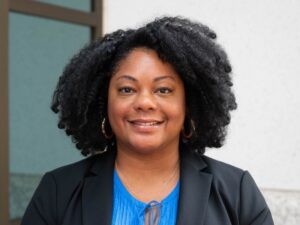
Amanda Wesson, UNC MPA Class of 2023
Hometown: Wake Forest, NC
Alma mater: North Carolina Central University
Degree: BA Psychology, MEd Communication Disorders
What’s your current title, and what do you do?
I am a speech-language pathologist of over a decade who most recently assessed preschoolers as part of a transdisciplinary team for a local school system. In this work, I used play therapy techniques to elicit responses for assessments to help determine young children’s needs. I also recently worked as an early childhood policy analyst with a non-profit organization. There, I helped coordinate events for legislators, synthesized information and provided policy considerations on various topics related to child care and early education.
What are your plans after graduation?
I recently signed on with Wake County Budget and Management Services to become a Budget and Management Analyst beginning in January! There, I will work closely with department staff to evaluate funding and program requests, collaborate to develop alternatives, and recommend approaches that align with the County’s overall objectives. I plan to engage in continuous learning activities and also hope to maintain my license and certification as a speech-language pathologist.
Looking back on who you were at the start of the program to who you are now, how have you changed?
Wow, it feels like so long ago, but I began this process as a direct provider and clinician. I knew I had a heart for public service and always strived to produce outcomes for public benefit. My experience led me to look at each case with an individualized lens. With the knowledge and connections I’ve gained from this program, I now have a head for public service—I’ve gained technical skills, theoretical frameworks, and practical experience. More than that, I’ve opened up myself to all the possibilities and ways I can contribute to my community and the communities of those I serve.
What is one class, one project, one faculty member, one experience, one discussion, or some other aspect of our program that had an impact on you and proved to be meaningful in your professional life?
I entered this program with a general idea of which direction I thought it would take me. However, I became interested in budget and management while taking PUBA 731 – Public Financial Management, taught by Monica Allen. I assumed it would be merely accounting, but it is much more comprehensive. It encompasses data, strategy, stakeholder and citizen engagement, problem-solving, and writing—many of the things that attracted me to the field of speech-language pathology. In taking this course, I realized how I could make a more significant impact at a macro level to support systems that provide education, public health, and human services.
A brief quote or piece of advice for those considering the UNC MPA or a career in public service?
The UNC MPA program has been instrumental in shaping my journey from a seasoned speech-language pathologist to an emerging public administrator in budget and management services. Embrace the opportunity to broaden your horizons, as the skills and insights gained here will empower you to make a meaningful impact in the lives of others.
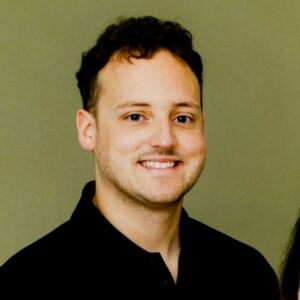
Shane Rudloff, UNC MPA Class of 2023
Hometown: Denver, CO
Alma mater: Ohio State University
Degree: BS International Relations
What’s your current title, and what do you do?
I am currently a Senior Grant Writer at a nonprofit called Growing Home in Westminster, CO. I build relationships with funders and secure grants for our programs which include a food pantry, a community garden, housing assistance, and early childhood education resources.
What are your plans after graduation?
After graduation I’d like to pursue a career in local government, preferably at the City Manager’s Office where I can interact with all kinds of stakeholders that work with government. I live by learning and enjoy observing the contexts and perspectives of different experts and professionals in the public sector.
Looking back on who you were at the start of the program to who you are now, how have you changed?
Looking back at who I was before I started the program, I’d say I’m much more cognizant of the inner workings of how the government operates. I was originally aware of the surface level details (elections, bills becoming law, politics, etc.), but now I understand there’s more that goes into getting things done (budgets, hiring the right people, working with private contractors, etc.). I have a more holistic view of how the public sector works.
What is one class, one project, one faculty member, one experience, one discussion, or some other aspect of our program that had an impact on you and proved to be meaningful in your professional life?
I would say that one class/experience that really stood out to me during my time at UNC was the immersion. I loved the opportunity to get to meet some of my peers in person which is a rarity for an online student. There I was able to meet some incredible professionals and people, and I am still very close friends with some of my classmates.
A brief quote or piece of advice for those considering the UNC MPA or a career in public service?
This is a pathway that provides an opportunity to help shape the way communities, states, and nations operate. It will make you a person people turn to when they are looking for solutions, and you will do little things daily that contribute to improving something. I take pride in that fact, and that is what public service is all about.
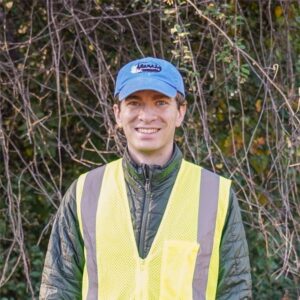
Joanthan Hill, UNC MPA Class of 2023
Hometown: Raleigh, NC
Alma mater: Duke University
Degree: Public Policy and History
What’s your current title, and what do you do?
My current title is Executive Director of Keep Charlotte Beautiful. I’m a full-time employee of the City of Charlotte, but it’s a little like running a nonprofit within the city government. The program has a City Council-appointed board, its own social media channels, and conducts some fundraising. An AmeriCorps service member (whom I manage) and I run numerous, community-driven initiatives related to litter prevention, waste reduction, and beautification.
What are your plans after graduation?
Throughout the MPA program, I’ve been able to apply lessons learned from class to greatly expand the programming scope and offerings of Keep Charlotte Beautiful. I hope to continue that after graduation. Two of my goals for the coming year are to launch a resident-operated ‘Friends of Keep Charlotte Beautiful’ spin-off nonprofit to enable easier fundraising for the program and to implement an in-depth litter study using our city’s Solid Waste Services department and students from UNC-Charlotte.
Looking back on who you were at the start of the program to who you are now, how have you changed?
When I applied for the program, I had just learned that I had received funding to hire an AmeriCorps service member for the first time, and wanted to hone in my leadership skills. The MPA program has enabled me to do that and more. In some instances, the MPA program enabled me to put a theoretical name to practices I was already implementing. In many others, it enabled me to consider new ideas and new ways of managing. I have become a more strategic-thinking, results-driven, and public-oriented manager because of it.
What is one class, one project, one faculty member, one experience, one discussion, or some other aspect of our program that had an impact on you and proved to be meaningful in your professional life?
As I mentioned to my oral exam panel, the idea of inspiring a shared vision from Kouzes and Posner’s The Leadership Challenge has stuck with me. Much of the work I do is collaborative, but a lot of it is driven by me, rather than being driven with the help of others. That message has reoriented my focus towards public engagement. In other words, I have what I think are a lot of great ideas, but they may not be what the public wants or even needs. Deploying a consensus-driven approach to tackling wicked problems provides for a more meaningful solution while broadening my perspective as a public servant.
A brief quote or piece of advice for those considering the UNC MPA or a career in public service?
Always consider how you might apply the lessons learned in class to your day-to-day work. Putting those theories to practice not only helps you learn more about them, it enables you to determine what works best for you.
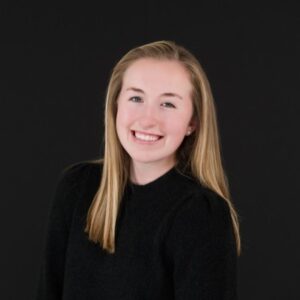
Julia Murphy, UNC MPA Class of 2023
Hometown: Pittsfield, MA
Alma mater: Providence College
Degree: BA in Political Science, Minor in Public and Community Service Studies
What’s your current title, and what do you do?
I am a Special Assistant to the Deputy Secretary at the United States Department of Commerce. I directly support the Deputy Secretary by overseeing his external engagements, supporting the day-to-day operations of the office, and advising on policy matters. As a political appointee in the Biden-Harris Administration, most of our work is centered around advancing and implementing the President’s priorities.
What are your plans after graduation?
I’m only three months into my current job so I’m hoping to stay for a while! I was working in the Massachusetts State Legislature when I began the program, so making the leap to the federal government and working in the executive was a goal that I had for a while and I’m grateful I was able to achieve while obtaining my MPA.
Looking back on who you were at the start of the program to who you are now, how have you changed?
My time in the program has reaffirmed that I want to be in public service for as long as I can. Taking classes while getting real-world experience allowed me to develop a public administration lens that I use every day to think about challenges, potential solutions, and how to move the needle forward. My decisions are directly informed by the frameworks and practical applications that I encountered in my courses. My ability to communicate concisely and effectively has significantly improved, and taking a deep dive into my leadership abilities has given me tremendous confidence both personally and professionally.
What is one class, one project, one faculty member, one experience, one discussion, or some other aspect of our program that had an impact on you and proved to be meaningful in your professional life?
This is such a hard question because I have genuinely learned so much from every professor, class, and classmate I’ve had! I think back to Prof. Julie Bregman’s Institutions and Values course that I took in my first semester of the program where we talked about equity as a core and competing value of public administration. When talking about equity versus effectiveness, I remember having a lightbulb moment where I said something along the lines of, “If programs aren’t working for the people they are intended to serve equitably, are they effective at all?” From this point forward, equitable public administration has been top of mind for me and has driven my focus areas in the program and the way that I think about the world, and is something I hope I can continue to foster as a public service leader. Government is a powerful tool to help people, and I would push back on anyone who claims that you can’t have equity and efficiency at the same time. It may not be easy, but it is our job as leaders to find a way forward.
A brief quote or piece of advice for those considering the UNC MPA or a career in public service?
The answer to both is simple — do it! There are a lot of complex challenges that our world faces and we need bold, courageous, thoughtful, and visionary leaders to take those challenges on. The UNC MPA equips you with the tools to tackle those problems, and you learn from the best and brightest faculty and classmates. Public service is an honorable undertaking and allows you to make an impact on other people’s lives in a way that other professions don’t offer. The MPA program was one of the best choices I’ve made and I feel incredibly well-prepared for wherever my path may take me.
Leisha DeHart-Davis is a professor of public administration at the University of North Carolina at Chapel Hill. She is also the director of the Local Government Workplaces Initiative at the School of Government. LGWI is a research program that investigates workplace climate and employee engagement. This information aids local government agencies in creating great work environments. DeHart-Davis also researches organizational behavior within the public sector, organizational structure, and workplace incivility. She is also a Fellow of the National Academy of Public Administration which is a nonprofit organization that provides expertise on public policy and governance issues. DeHart-Davis is also a two-time published author of Creating Effective Rules in Public Sector Organizations and Understanding Gender Imbalance in Public Sector Leadership. Her research articles have also been published in Journal of Public Administration Research and Theory, Public Administration Review, International Public Management Journal, Administration and Society, and Review of Public Personnel Administration. The article is an interview with Leisha DeHart-Davis about her service through research to the University of North Carolina at Chapel Hill. It discusses her career path and her passion for local government. It also highlights her overall dedication to the School of Government and the Carolina community.
Read the full interview written by UNC Research here.
The School of Government is pleased to announce that Willow S. Jacobson has been selected by the National Academy of Public Administration for inclusion in its 2023 Class of Academy Fellows, in recognition of her years of public administration service and expertise.
Jacobson is a distinguished professor of public administration and government at the School, where she also serves as associate dean for graduate studies and director of the UNC Master of Public Administration program. She is an expert on human resource management, leadership development, and organizational theory and behavior. Jacobson’s research has appeared in publications including Public Administration Review and Public Personnel Management.
Previously, she directed the LGFCU Fellows program, which she helped create in 2011 to develop local government leaders in North Carolina. She earned a Ph.D. from Syracuse University and joined the School’s faculty in 2003.
She joins fellow faculty members Leisha DeHart-Davis, Kimberly L. Nelson, Carl W. Stenberg, and David N. Ammons (ret.) as current Academy Fellows.
“I am very pleased to welcome Willow Jacobson to the Academy’s 2023 class of Fellows,” said Terry Gerton, President and CEO of the Academy. “Our distinguished Academy Fellows are nationally recognized and respected for their expertise in the field of public administration and Willow is no exception. We proudly welcome this outstanding new class of Fellows that will help advance the Academy vision – a just, fair, and inclusive government that strengthens communities and protects democracy.”
Selection of the Academy’s new Fellows follows a rigorous review of the individual’s contributions to the field of public administration and policy. A Fellows Nominating Committee makes its recommendations to the full Fellowship, which then votes on those individuals to be elected. The 2023 class joins nearly 1,000 Academy Fellows—including former cabinet officers, members of Congress, governors, mayors and state legislators, as well as prominent scholars, business executives, and public administrators.
Induction of the new Fellows will occur during the annual Academy Fall Meeting, which will take place in-person November 1-3 at the Grand Hyatt Hotel in Washington, D.C., with a focus on “The Grand Challenges in Public Administration.”

Panel discussion participants Christopher Everett, Alex Lassiter, Elizabeth Biser and Pablo Friedmann discuss how Tar Heels contribute to North Carolina during the 230th University Day celebration at Memorial Hall on the campus of the University of North Carolina at Chapel Hill. Thursday October 12, 2023. (Jon Gardiner/UNC-Chapel Hill)
UNC Master of Public Administration program alumna Elizabeth Biser participated as a panelist at 2023 University Day on October 12, 2023. This year’s University Day celebrated UNC’s 230-year-history and centered around the theme of “Service to Our State.”
Biser ’17 spoke on a panel with three fellow UNC alumni, discussing “Tar Heel Contributions to North Carolina.” The conversation was facilitated by UNC Study Body President Christopher L. Everett. Pablo Friedmann ’09, director of the Multilingual Resource Center for Durham Public Schools, and Alex Lassiter ’10, founder and CEO of GreenPlaces, spoke alongside Biser.
As secretary of the North Carolina Department of Environmental Quality (DEQ), Biser is charged with oversight of the agency, which protects the state’s environment and natural resources. Its programs seek to safeguard air, water, land, coastal fisheries, and the public’s health; the agency also offers technical assistance and encourages responsible behavior and respect toward the environment.
Biser spoke during the panel about the honor to work with and lead her colleagues in the effort to safeguard North Carolina’s environmental future.
“Getting a chance to lead the state agency whose mission is to provide science-based environmental stewardship for the health and prosperity of all North Carolinians is an honor every day,” she said.
“I work with 1,600 folks across the state whose entire career is dedicated to making sure that we have clean air to breathe, clean water to drink, and that our environment is supporting our way of life.”
Biser credited her educational experience at the School of Government—and particularly the UNC MPA program—as vital in instilling the knowledge and interpersonal skills necessary to lead the agency’s increasingly complex work.
“The lessons that I learned at the School Government definitely helped me every day in thinking about public service leadership, how to motivate a team that is dedicated to public service, that faces so many challenges, especially in an increasingly divisive world.”
Closing out the discussion, Biser spoke to the audience about the importance of lifelong learning, in public service or any other professional field.
“Learning does not stop once you graduate. To prepare for public service—and really to prepare for anything—it’s about not thinking that the last time you walk out that classroom that it’s over,” she said.
“The key to success is making sure you are growing as a person, you are growing your skillset, and you are learning from other fields and sectors around you.”
Biser imparted the audience with advice to succeed in truly making an impact in their work: have a continued desire to be curious, ask questions, learn from them, and grow.
“The people that I have seen be most successful have embodied that lifelong learner mentality and seek out opportunities to improve.”
Biser is a double graduate of UNC-Chapel Hill, holding a Bachelor of Arts and a Master of Public Administration. She has a strong background in environmental affairs. In addition to her work at Biser Strategies LLC, she served as vice president of policy and public affairs at The Recycling Partnership, government relations and policy director for Brooks, Pierce, McLendon, Humphrey & Leonard LLP, and as director of legislative and intergovernmental affairs at the North Carolina Department of Environment and Natural Resources (the predecessor of DEQ). Biser served on the School’s Foundation Board from 2019 to 2021.
Each year on Oct. 12, Carolina celebrates University Day, which marks the laying of the cornerstone of Old East — the campus’ first building and the oldest state university building in the nation. The day is a celebration of our mission as the country’s first public university and our service to North Carolina, the nation and the world through our teaching, research, and public service.
Watch the full recording of the University Day ceremony.
This Fall we welcomed 29 new students into the online format of our MPA. They come from different geographic regions, bring varied interests and experiences, and we are so happy they chose us. Read about 3 of them here!
Hometown: San Diego, CA
Alma mater: UNC-Chapel Hill
Degree: Bachelor’s degree in Public Policy
Where were you before you joined the MPA program?
I attend the online MPA@UNC program from Nashville, Tennessee where I lead education and outreach efforts for Metro Nashville Waste Services, a division of metropolitan government. I develop waste reduction programs and promote resilient waste, recycling, and composting collection for Nashville residents.
I was born and raised in San Diego, California and I attribute my passion for local environmental regulation from growing up surrounded by these policies in my own community. I took this passion with me to Chapel Hill when I attended Carolina for my undergraduate studies in Public Policy and Environmental Studies. I would not be where I am without the expertise and guidance from UNC Public Policy faculty, and I am thrilled to be returning virtually to Carolina to further my skills for public service.
What are your areas of interest in the program?
I was drawn to the MPA@UNC program because of its clear focus on building public service leaders. I have already enjoyed meeting fellow public servants in my first semester classes – some of my classmates are city planners, librarians, civil affairs officers, municipal information technology managers, and elected officials. I enjoy opportunities to get to know my classmates and learn from their specialized experiences within public service.
I also plan to concentrate in Local Government, which includes coursework such as City and County Management, Productivity Improvement in Local Government, and Governmental and other Nonprofit Accounting and Reporting. I look forward to learning a deeper understanding of local government structure and function through this coursework.
Why did you decide to get your MPA at UNC?
Through my combination of undergraduate and professional work experience in waste reduction, I envision a career path for myself championing solid waste regulation to serve communities across the United States. The MPA@UNC curriculum provides the academic and public service framework that will position me for greater professional success in this field.
It is an honor to be furthering my public administration education at my alma mater and the country’s first public university. I value that Carolina faculty are committed to understanding and improving government.
Hometown: Richmond, Virginia
Alma mater: Hampton University
Degree: Bachelor’s degree in Finance
Where were you before you joined the MPA program?
Before I joined the MPA program I was doing a few things. First, I am currently a Bank Examiner at the Federal Reserve Bank of Richmond. Second, I am a JV Football Coach at Glen Allen High School. For me this is my day-to-day life, and those two roles definitely keep me busy.
What are your areas of interest in the program?
There are many things about the program that interest me but so far my intro to public administration course has kept my attention the most. To see the connection between how governments interact with each other has super interesting and has opened my eyes to the roles we can play in public administration.
Why did you decide to get your MPA at UNC?
I decided to get my MPA from UNC because I have always wanted to be a Tarheel. My parents used to bring to the football games as a kid and I loved the Tarheel spirit. In addition to that, my mentor at the Federal Reserve went through the MPA program here and loved it! So I truly only had one option.
Hometown: Royal Oak, Michigan
Alma mater: Michigan State University
Degree: Bachelor’s degree in Social Relations and Policy
Where were you before you joined the MPA program?
I graduated from Michigan State University in 2014 with an undergraduate degree in Social Relations and Public Policy. I then began working at a high school in Detroit through the College Advising Corps, an AmeriCorps program. After my AmeriCorps service ended, I moved to Washington, DC, where I began working in program operations at the Relay Graduate School of Education—a nonprofit institution of higher education that provides a variety of professional development programs to teachers and school leaders across the country. I now live back home in Metro Detroit.
What are your areas of interest in the program?
I have greatly enjoyed the trajectory of my career thus far, working in direct community outreach, program operations, and partnership development. I am eager to get better at the work that I have been doing and to learn how to be a stronger leader at public service institutions. The MPA@UNC covers topics that I am interested in—for example, how can I be a strong organizational leader, particularly in the nonprofit space? How can I better collect, interpret, and react to data? How can I be a good steward of public dollars?
Why did you decide to get your MPA at UNC?
The MPA@UNC was my top choice when looking at graduate programs. This program is offered online, which would allow me to stay in Michigan, stay in my current role, and ensure a strong alumni network both in and out of North Carolina. The interactive structure of the program ensures that I will have the opportunity to engage in the material, not just complete asynchronous assignments. Finally, I was excited at the opportunity to visit campus and meet fellow students at an Immersion weekend on campus.